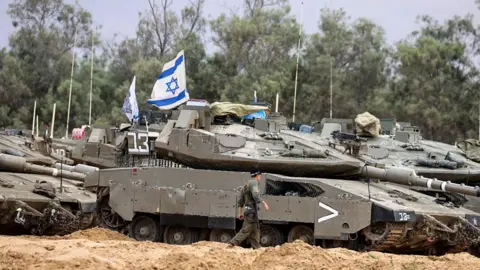The current situation in Gaza has escalated as the Israeli military initiates a substantial call-up of reservists, aimed at intensifying its ongoing operations in the region. This announcement comes on the heels of public tension following the breakdown of a ceasefire agreement. The Israel Defense Forces (IDF) has stated that their objectives include increasing pressure on Hamas militants and working towards the safe return of hostages believed to be held in Gaza. The call-up of reservists could involve tens of thousands of individuals, which marks a significant expansion of military involvement in the conflict.
Criticism has emerged from various quarters, as the recent military offensive, which took place after the cessation of a temporary peace agreement, has not yielded favorable results in hostage negotiations. Detractors are questioning Israeli Prime Minister Benjamin Netanyahu’s overarching strategy and goals, especially concerning the implications for civilians caught in the crossfire. The military’s plans suggest operations in additional territories in Gaza with a promise to dismantle all infrastructure that supports Hamas, both above and below ground.
The Israeli security cabinet is poised to meet on Sunday to potentially approve this expanded military campaign. However, it has been noted that international efforts to mediate and facilitate a ceasefire have faltered, particularly concerning the fate of the remaining hostages, 24 of whom are still believed to be alive. Since the Israeli resumption of military action on March 18, there have been no hostages released, further complicating the situation.
Since the start of the military offensive, Israel has made significant territorial gains within Gaza, displacing hundreds of thousands of residents in the process. The stated strategy from the Israeli government is to apply relentless pressure on Hamas, and this includes imposing blockades on humanitarian aid to the region, which has been in place for several months. Humanitarian organizations have condemned this tactic, describing it as a potential act of war crime amid an escalating crisis that has led to acute shortages of basic supplies such as food and medical care.
The humanitarian impacts of the conflict are severe, with claims that an expanded military offensive may exacerbate the ongoing struggles faced by reservists. Many of these individuals report having been called up multiple times during the protracted conflict, raising worries among their families and communities about the sustainability of this military approach. There is growing public concern that Prime Minister Netanyahu may be prioritizing political objectives over humanitarian considerations, with accusations coming from various factions that he is negotiating in bad faith and potentially prolonging the conflict for personal or political gains.
The military’s presentation of its operational plans has intensified calls within Israeli society for a shift in focus from warfare to diplomatic resolution, particularly regarding the negotiation of hostage situations. Recent public protests have erupted across major Israeli cities, including significant demonstrations in Tel Aviv, where family members of hostages have voiced urgent pleas for an end to hostilities and the prioritization of negotiations aimed at securing the safe return of their loved ones.
On the military front, fatal incidents continue to mount; the IDF has communicated recent losses among its troops. Additionally, regional tensions are high, compounded by a missile strike from Yemen reportedly targeting Israeli air space, which has escalated fears of widening conflict within the region. The risk of retaliatory actions or further escalation looms as regional actors voice their positions on the conflict, indicating a complex web of interactions that may affect future peace efforts.
As of now, the situation remains volatile, with significant implications for both the military objectives and the humanitarian crises emerging from the conflict. The ongoing war has reportedly resulted in a tragic loss of life in Gaza, and critical questions remain about the future trajectory of the Israeli military campaign and the prospects for peace in the region.



